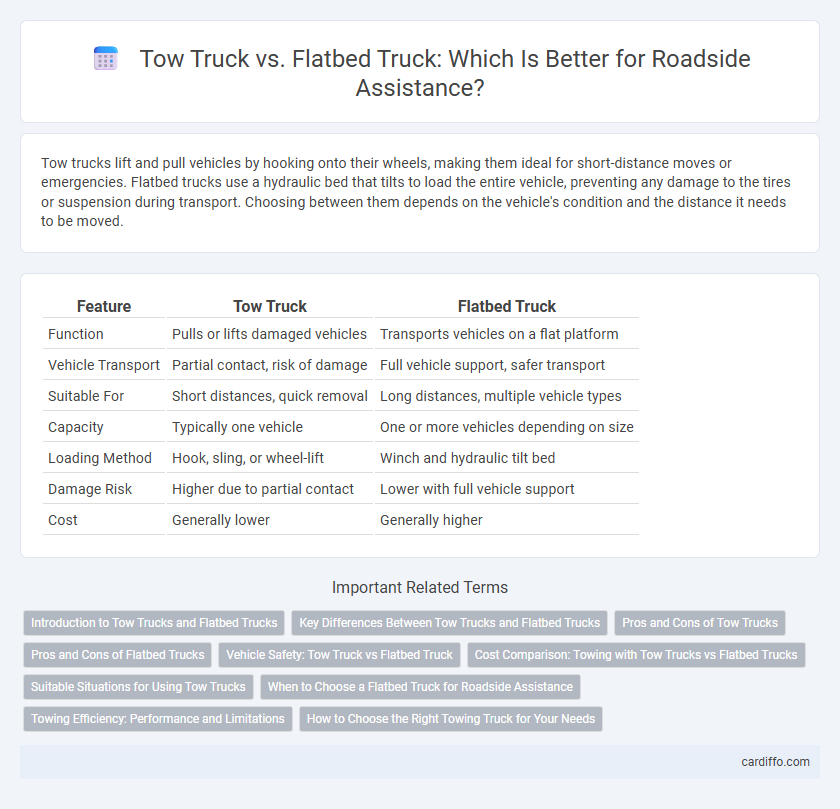Tow trucks lift and pull vehicles by hooking onto their wheels, making them ideal for short-distance moves or emergencies. Flatbed trucks use a hydraulic bed that tilts to load the entire vehicle, preventing any damage to the tires or suspension during transport. Choosing between them depends on the vehicle's condition and the distance it needs to be moved.
Table of Comparison
| Feature | Tow Truck | Flatbed Truck |
|---|---|---|
| Function | Pulls or lifts damaged vehicles | Transports vehicles on a flat platform |
| Vehicle Transport | Partial contact, risk of damage | Full vehicle support, safer transport |
| Suitable For | Short distances, quick removal | Long distances, multiple vehicle types |
| Capacity | Typically one vehicle | One or more vehicles depending on size |
| Loading Method | Hook, sling, or wheel-lift | Winch and hydraulic tilt bed |
| Damage Risk | Higher due to partial contact | Lower with full vehicle support |
| Cost | Generally lower | Generally higher |
Introduction to Tow Trucks and Flatbed Trucks
Tow trucks are essential roadside vehicles designed for towing or hauling disabled, improperly parked, or impounded cars using hooks, chains, or wheel-lift systems. Flatbed trucks provide an alternative method by carrying vehicles entirely on their flat, horizontal beds, which offers enhanced stability and protection during transport. Both types serve critical roles in roadside assistance and vehicle recovery, each suited to different towing needs and vehicle conditions.
Key Differences Between Tow Trucks and Flatbed Trucks
Tow trucks use hooks, chains, or wheel-lifts to tow vehicles, making them ideal for moving damaged cars short distances. Flatbed trucks feature a large, flat platform that lifts the entire vehicle, providing safer transport for long distances and preventing further damage. The key differences lie in their loading mechanisms, capacity for vehicle types, and suitability for various towing situations.
Pros and Cons of Tow Trucks
Tow trucks offer quick and versatile roadside assistance, excelling at towing vehicles with front or rear-wheel damage, but they may cause additional wear on the towed vehicle's tires and suspension. Flatbed trucks provide safer transport by carrying vehicles entirely off the ground, reducing risk of further damage, yet they require more space and time for loading and unloading. Tow trucks are generally more cost-effective for short-distance towing but less suitable for long-distance or luxury vehicle transport compared to flatbed trucks.
Pros and Cons of Flatbed Trucks
Flatbed trucks offer the advantage of transporting a wide variety of vehicles, including those with severe damage or non-operational status, by providing a completely level platform that minimizes further damage during transit. Their versatility and safety make them ideal for carrying motorcycles, luxury cars, and heavy machinery, but they can be less maneuverable and require more space for loading compared to traditional tow trucks. The higher cost of flatbed towing services and the need for specialized equipment and operator training are notable downsides that impact accessibility and pricing.
Vehicle Safety: Tow Truck vs Flatbed Truck
Tow trucks and flatbed trucks both play crucial roles in roadside assistance, but flatbed trucks offer superior vehicle safety by fully lifting the disabled vehicle off the ground, minimizing tire and suspension damage during transport. Tow trucks, which tow vehicles by hooking them to the rear or front wheels, can cause additional wear or damage, especially to all-wheel-drive or low-clearance vehicles. Flatbed trucks reduce the risk of road debris impact and improve stability, making them the preferred choice for transporting high-value or delicate vehicles safely.
Cost Comparison: Towing with Tow Trucks vs Flatbed Trucks
Tow trucks typically offer lower upfront fees and hourly rates compared to flatbed trucks, making them cost-effective for short-distance or light vehicle towing. Flatbed trucks, while more expensive per mile, provide safer transport for vehicles, reducing risk of damage that could lead to costly repairs. Choosing between tow trucks and flatbed trucks hinges on balancing immediate towing costs against potential long-term expenses related to vehicle safety and condition.
Suitable Situations for Using Tow Trucks
Tow trucks are ideal for short-distance vehicle recovery, roadside assistance, and removing vehicles that can be easily towed without causing damage. They are commonly used for disabled cars on highways, breakdowns in urban areas, and light-duty vehicle transport. Tow trucks offer quick and efficient solutions for towing vehicles with mechanical issues or minor accidents where flatbed trucks may be unnecessary.
When to Choose a Flatbed Truck for Roadside Assistance
Flatbed trucks are ideal for roadside assistance when transporting vehicles with severe damage, all-wheel drive, or low ground clearance to prevent further damage during loading. They provide a stable platform that evenly distributes weight, ensuring safe and secure transport over long distances or rough terrain. Flatbed trucks are preferred for carrying motorcycles, vintage cars, and vehicles with extended or custom parts that cannot be towed conventionally.
Towing Efficiency: Performance and Limitations
Tow trucks excel in quickly securing and towing vehicles with minimal setup, making them highly efficient for short-distance recovery and light to moderate damage scenarios. Flatbed trucks offer superior performance in safely transporting heavily damaged or non-operational vehicles by providing complete vehicle stability and preventing further wear during transit. Limitations of tow trucks include potential vehicle damage due to lifting methods, while flatbed trucks face challenges in maneuverability and longer loading times.
How to Choose the Right Towing Truck for Your Needs
Choosing the right towing truck depends on the type of vehicle and load weight; tow trucks are ideal for quick transport of immobilized vehicles, while flatbed trucks provide secure, full-vehicle support during transit. Consider road conditions, vehicle size, and the towing equipment's weight capacity to ensure safety and efficiency. Professional roadside assistance services often recommend flatbed trucks for luxury or all-wheel-drive vehicles to prevent damage.
Tow truck vs flatbed truck Infographic

 cardiffo.com
cardiffo.com